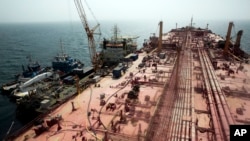The United Nations said Tuesday that a long-awaited operation has begun to remove more than a million barrels of oil from an aging supertanker off Yemen’s Red Sea coast, averting a potential environmental disaster.
“As of this morning, we are very pleased to report that the pumps are on, the pipes have been laid between the FSO Safer and the Yemen — the replacement tanker — and the first gallons of oil have in fact been pumped off the Safer onto the Yemen,” U.N. Development Program Administrator Achim Steiner told reporters.
The ship-to-ship transfer will continue around the clock and is expected to take 19 days.
The FSO Safer was the subject of more than three years of appeals from the U.N. and environmental organizations who warned that a lack of maintenance during Yemen’s civil war meant the decaying tanker was at risk of spilling four times as much oil as happened in the 1989 disaster involving the Exxon Valdez off the coast of Alaska.
The Safer is one more casualty in the eight-year war between the Saudi-backed internationally-recognized government and Iranian-supported Houthi rebels. The Houthis control the area where the tanker is anchored, and until last year withheld the necessary permissions and security guarantees to allow an assessment team access to the site in the lead-up to the salvage operation. Raising the funding for the $143 million operation further delayed it.
U.N. Secretary-General Antonio Guterres said the work is “the critical next step in avoiding an environmental catastrophe on a colossal scale.” Experts said if the tanker leaked or exploded, the environmental and economic damage could cost $20 billion.
“It was never question of if, it was only a question of when,” said David Gressly, U.N. resident and humanitarian coordinator for Yemen, of a potential catastrophe.
Gressly has been in the lead on U.N. system-wide efforts to secure the Safer since September 2021. He spoke to reporters from the bridge of the salvage vessel Endeavor, which arrived in the area on May 30 to help stabilize the Safer ahead of the oil transfer.
The United States also welcomed the start of the salvage operation, to which Washington has contributed $10 million. It is one of 23 countries which have contributed to financing the operation. Funding has also come from the private sector and a crowd-funding campaign.
The U.N. still needs $22 million to complete the operation and address all residual environmental threats posed by the tanker.
Once the oil is successfully transferred, the Safer will be towed, environmentally cleaned, and taken to a green scrap yard for recycling. So far, no agreement has been reached between the Yemeni government and the Houthis on the sale of the oil, but the U.N. says it is continuing to work with the parties on it.
In recent months, the parties to the conflict have started to engage, boosting hopes the war could finally be drawing to an end. The UNDP’s Steiner said he hopes the Safer operation could contribute to peace.
“One wants to be hopeful that a successful conclusion of this operation would also at least add confidence on both sides that something in terms of next steps is not only desirable, needed, but also possible,” he told reporters.





